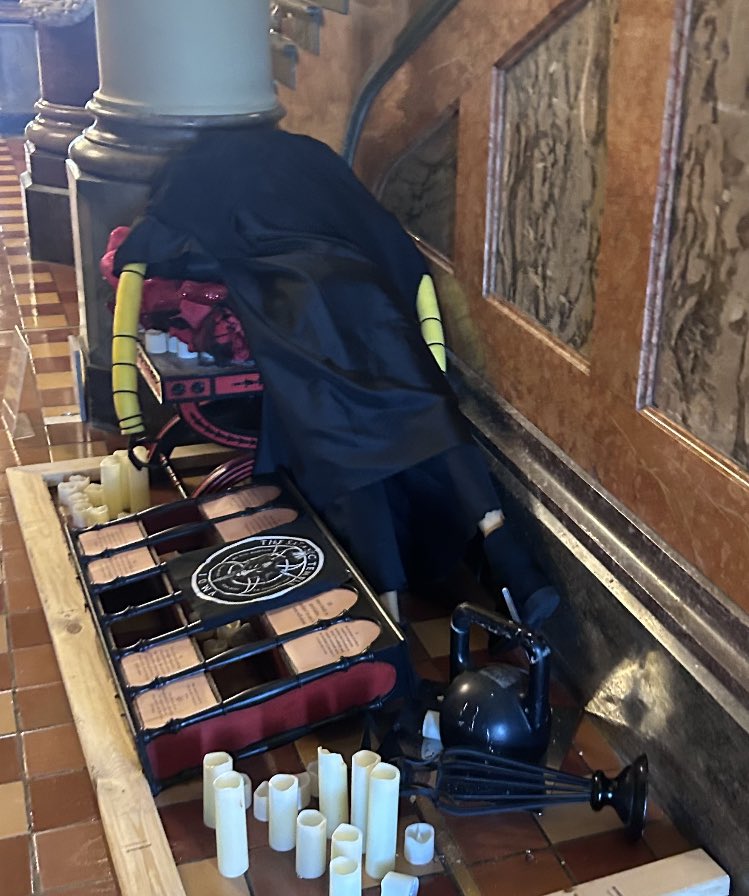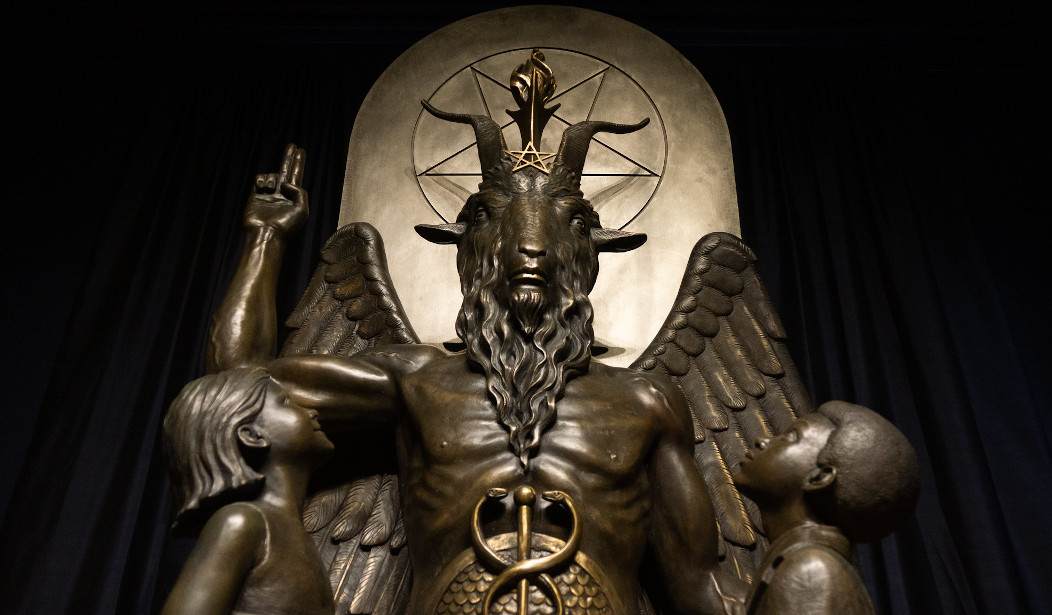Thursday, Michael Cassidy, a US Navy Reserve aviator, tore down and beheaded a Satanist Baphomet statue erected in the Iowa State Capitol. He's since been charged with "4th-degree criminal mischief," but he is a hero for our times.
The saga started when the so-called Satanic Temple Iowa, the local chapter of the national organization of Lucifer worship cult and social media trolls, applied to the Department of Administrative Services for a permit to display their satanic idol in the Capitol building.

Originally, this group had asked to use a goat's head on the idol, but that was somehow deemed inappropriate, while the whole Baphomet thing met with bureaucratic approval. The Satanists were beside themselves with glee.
In a statement on Monday, the Satanic Temple Iowa said it was proud to take part in the holiday season at the state Capitol.
The tenets portrayed on the statue, the group said, advocate “for bodily autonomy, a rejection of arbitrary authority, recognizing our own fallibility, and inspiring nobility in thought and action which we hope enlightens the viewer to our beliefs and inspires one to reflect upon their own approach to the world.”
“We thank the staff of the Capitol, the Capitol Police and the Department of Administrative Services for holding fast to the principle of religious freedom and ensuring all religions have an equal opportunity to celebrate the holidays together in our beautiful Capitol,” the group said in the statement.
The placing of an altar to Satan in the State Capitol, though oddly in keeping with the activities there, was not without protest. Republican Governor Kim Reynolds registered a feeble response.
“Like many Iowans, I find the Satanic Temple’s display in the Capitol absolutely objectionable. In a free society, the best response to objectionable speech is more speech, and I encourage all those of faith to join me today in praying over the Capitol and recognizing the nativity scene that will be on display – the true reason for the season.”
One of the saddest responses was from Iowa Republican State Representative Jon Dunwell, who is also an ordained minister.
My Observations and Response as an Iowan, State Representative, and Pastor. The quote is from his comment about the presence of a satanist idol in the State Capitol, where he represents his district on "X."
• My observation as a follower of Christ, I certainly find a display from the Satanic Temple objectionable. It stands in direct opposition to my faith and would be classified as evil. Not a new experience for me or my family. The Word of God continually warns about the dangers in our world. In fairness, many other religions or nonreligious people have the same perspective about Christianity.
• My observation as an Iowan and a State Representative, I don’t want the state evaluating and making determinations about religions. I am guided by the First Amendment of the US Constitution.
• My response as a follower of Christ…
o The display is an inanimate object that has no real power in and of itself. We have nothing to fear.
o Oppose the message of the display. It is not just another way to worship the same god. There are DIFFERENCES that need to be pointed out. The display glorifies the evil influence we oppose.
o The primary response required is prayer.
o The display itself is an invitation of the work we have yet to do. Iowa needs Jesus.
o The display provides a teaching example for our families of the difference between the person and work of Christ and that of Satan. (Love, light and sacrifice compared to a dark, foreboding creature).
o My faith is never imposed upon others, nor should it ever become a direct part of government. It is always a response to the person and work of Jesus Christ. I don’t want to mix the kingdoms! Government is a poor arbitrator of religion.
o Take full advantage of the opportunities to express our faith in appropriate displays and programs at the Capitol.
I can only note that both Reynolds and Dunwell recommended prayer as an antidote to the evil they allowed into the Capitol, but neither apparently had the time nor inclination actually to organize a prayer vigil.
I think there are any number of ways the Iowa bureaucrats could have addressed this issue without allowing the Satanist Temple to troll Christians as we celebrate the Incarnation of the Son of God. Indeed, when looking at the entire episode, you can almost see bureaucrats hostile to religion chortling over a Baphomet in the Capitol at Christmas. But they didn't.
We're seeing the same pseudo-First Amendment attacks on Christianity manifesting themselves in Satanist "Kids Clubs" at elementary schools.
First Satanic Temple Kids Club Comes To Memphis Elementary School https://t.co/6LzwV2Qgbw pic.twitter.com/g6064S4snX
— Daily Wire News (@DailyWireNews) December 15, 2023
🚨 🚨 🚨
— Julio Menendez (@Julio_Econ) December 12, 2023
Wow, look at that. Not only are Satanists targeting kids, they're doing it at a PUBLIC school.
Oh don't worry. Its "not affiliated with the school district." It's only IN THE BUILDING. pic.twitter.com/cWFJ1qPx9h
Satan club comparison chart! pic.twitter.com/p4IrfVaV7P
— Chris Dancy 🌈🧠🧙🏼♂️🤖 (@chrisdancy) May 9, 2023
First and foremost, no Christian is under any moral, legal, or ethical obligation to permit public recognition of Satanism. Unlike Islam, Judaism, Hinduism, or any other religion, Satanism is an anti-religion. Satanism is not found as a religion anywhere in the world. It is based on Christianity and designed to either mock (if you are one of its trollish members) or counter (if you are an actual Satanist) Christianity in places where the government will not act to prevent a state-sponsored insult to Christians (this, by the way, should be viewed as a First Amendment issue because the state, by allowing Satanism to be juxtaposed to Christianity, is actually disfavoring Christianity and helping Satanism to recruit members). If Satanists want to display their idols on their holidays, that is one thing; allowing them to "counter-program" a Christian holiday is something entirely different.
Second, in the words of former Philadelphia Archbishop Charles Chaput, tolerance is not a Christian virtue.
We need to remember that tolerance is not a Christian virtue. Charity, justice, mercy, prudence, honesty — these are Christian virtues. And obviously, in a diverse community, tolerance is an important working principle. But it’s never an end itself. In fact, tolerating grave evil within a society is itself a form of serious evil. Likewise, democratic pluralism does not mean that Catholics should be quiet in public about serious moral issues because of some misguided sense of good manners.
Indeed, I'm under a positive obligation as a Christian to oppose this nonsense. In the Old Testament, the sign that preceded most Israelite kings' demise and the First Temple's destruction was a tolerance to altars to Baal and Moloch and to their worship. The first sign that a new sheriff was in town was the destruction of these altars and the suppression of those cults. If we lack the guts to stand up and declare the use of the Constitution in a bad-faith effort to denigrate Christianity wrong, we have no right to complain about the judgment that follows.
I'm not even sure that Satanism qualifies as a religion under the First Amendment.
For our purposes, the most interesting part of the Carpenter case is the admitted shift in the court’s understanding of religion. Since the Constitution does not define religion, the court “must turn to case law for guidance.” The court begins by noting that early Supreme Court precedent “defined religion in traditional theistic terms.” Keep this in mind, because for the originalist, this should largely be the end of the analysis. The court goes on to state, however, that over time the standard expanded to include unorthodox religions and even belief systems that are non-theistic.
...
There are two important concepts that rebut the idea that Satanism is protected by the Free Exercise Clause of the First Amendment. First, anti-blasphemy laws were consistently upheld as compatible with free exercise of religion: According to the Harvard Law Review, “the blackletter rule was clear. Constitutional liberty entailed a right to articulate views on religion, but not a right to commit blasphemy — the offense of ‘maliciously reviling God,’ which encompassed “profane ridicule of Christ.’” Throughout the nation’s history and even into the twentieth century, the federal courts have consistently upheld state anti-blasphemy laws as constitutional. There is no binding precedent stating that anti-blasphemy laws violate the First Amendment.
This is where the actual content of religious claims matters. A simple look at the Church of Satan website or its Wikipedia page (for both of which I intentionally choose not to provide a link) clearly show that the views of the Satanic sect revile God and ridicule Christ. Thus, the practice of “Satanism” is itself blasphemous. By law it ought to be punishable, not protected.
The fact that the practice of Satanism is itself blasphemous and thus historically does not deserve First Amendment protection leads to the question that emerged in discussing the Carpenter case above: what is religion under the First Amendment? We get very little guidance from the text of the Constitution itself. The text tells us that Congress shall not prevent the free exercise of religion; the incorporation doctrine based on the Fourteenth Amendment extends this protection to the state governments. But nowhere does the text of the Constitution define religion.
As the saying goes, we are in danger of being so open-minded that our brains are in danger of falling out.
Michael Cassidy had the guts to do something every Christian who passed by that idol should've done.















Join the conversation as a VIP Member